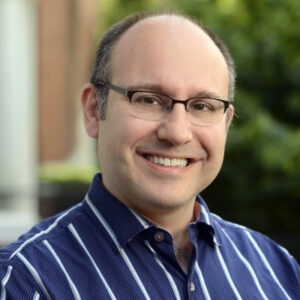This post is part of a series on the Ralph O’Connor Sustainable Energy Institute (ROSEI) website that will feature Q&A’s with our affiliated researchers. Next up is Jonah Erlebacher, a professor in the Department of Materials Science and Engineering who also serves on ROSEI’s leadership council.
How did you first get involved with or learn about sustainability?

Jonah Erlebacher
Jonah Erlebacher (JE): It has been an evolution for me. When I was a student, I was definitely in the academic mind frame. The quote “science for the sake of science,” would probably be apt for my approach. I got interested in these very high surface area metals, and at the same time I joined the Whiting School of Engineering. Being at an engineering school helps change one’s perspective towards applicability and having relevance to the world in some way. These high surface area metals I was studying were natural candidates for catalysis, and I became intrigued using this class of metals for various applications in the chemical processing world. In particular, I became interested in hydrogen fuel cells, which I worked with for many years. That drove my interest towards learning about the context of what kind of materials innovations will be required for the next generation of sustainable energy technologies.
Ultimately, fuel cells are run by hydrogen, so then I became interested in hydrogen. As I spend more and more years in this field for years, my perspective has gotten bigger and bigger. I had to ask questions like “Where does hydrogen come from” and that sparked my interest in getting hydrogen from natural gas. If we can get hydrogen from natural gas and separate out the carbon, then there is a materials problem: What do you do with all the carbon that is left over? Upgrading carbon from low quality products like powder to high performance materials like fiber is part of all that.
In short, I see my interest in sustainability like a tree: As my interest grew, the trunk got wider, I grew more branches. My evolution was very organic.
Why are you passionate about sustainability/renewable energy?
JE: I think that the climate crisis is not something that should be underestimated in its importance and immediacy. I am lucky to work in an area where we can potentially make an impact in reducing CO2 emissions, and there is a real sense of urgency. This isn’t the sort of issue that you want to sit around waiting for improvement. You want to get out into the world and try to make the situation better.
How does your commitment to sustainability play out in your everyday life?
JE: I have a brand new fully electric car. So, while I don’t own an old beat-up vehicle with good gas mileage, it is a fantastic car that is entirely electric. I love that I am no longer filling up at the gas station.
Tell us about your research, and what aspects currently or in the future tie into sustainable energy efforts?
JE: My research within the context of ROSEI revolves around making hydrogen and solid carbon through chemical decomposition of fossil fuels (as well as converting CO2 to carbon). It’s a bit of a unique way of potentially getting to a cleaner world because it relies on fossil fuels. At the same time, I am advocating to cut CO2 emissions, which is the bigger problem. What I am trying to do is create an environment in which using clean fuels that don’t create CO2 emissions is possible, while also making products that have high value like fiber or other structural carbon. In my mind, this incentivizes our general societal need to be more sustainable.
My research currently is predominately associated with methane decomposition, turning methane and natural gas into carbon and hydrogen. We have a novel chemical route to doing that which involves chemistry that has never been studied before, which means there are lots of opportunities and potential interesting unknown paths that we could go down. Needless to say, it has been a fun journey for me and my group.
What advice or suggestions do you have for students who want to pursue careers in sustainable energy?
JE: For a student who wants work in sustainability, I think it’s essential for them to have a positive outlook on how it can be implemented. That sustainability can be implemented in a way that makes life easier for people and also more fulfilling. Sustainability should not be approached or presented to the general public as a pursuit where major sacrifices will need to be made to our usual daily lives for it to be successfully implemented.
How has the creation of ROSEI affected sustainable energy efforts at Hopkins?
JE: I hope that ROSEI drives transformative change in the way that Hopkins approaches sustainable energy efforts. By creating an interdisciplinary community of likeminded people who are committed to making the world a better place, it makes it easier to work together to solve the biggest challenge of our lifetime.
What I also like about ROSEI is it’s happening at the right time. One of the missions of Hopkins is not to just do research in the now, but to train future leaders. Climate change is important right now, and critical based on the news, weather and various bad things that now happen annually. It is becoming more and more of an issue, but things will likely get worse 10-20 years from now. At that point, we don’t want Hopkins to be playing catch up and starting an institute that focuses on sustainable energy. By starting ROSEI now it allows us to train the people who will be making critical decision in the next 10-20 years. Hopkins needs to be in the mix and leaders in this field. We have the potential to do so and that should always be our aim.